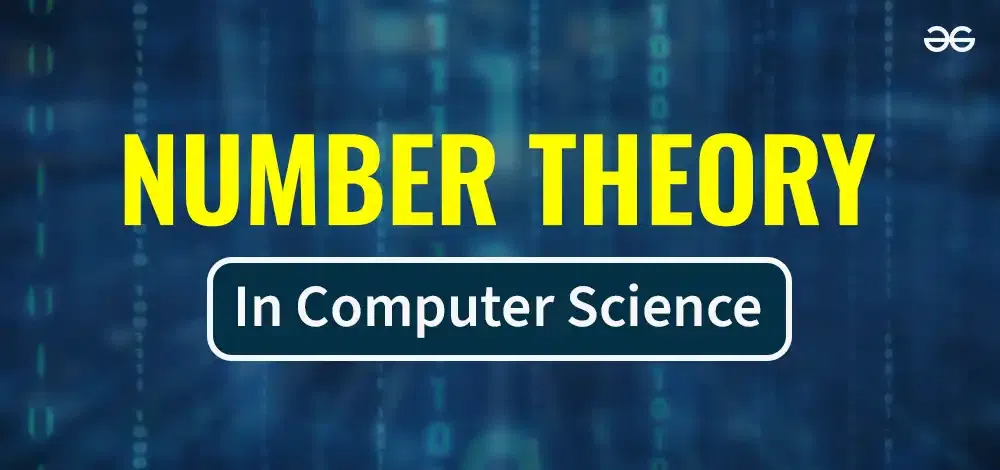Number Theory in Computer Science
Last Updated :
17 Apr, 2024
Computer Science is heavily dependent on mathematics and number theory is one of the branches which is widely used. Number theory is a branch of maths that deals with numbers and relations among them such as divisibility, prime numbers etc. This branch has various applications in computer science.

Number Theory in Computer Science
In this article, you will learn various applications of number theory in computer science.
What is Number Theory?
Number theory is a branch of maths that deals with numbers and relations among them. Various concepts come under it some of them are:
- Even Numbers: Numbers that are divisible by 2 are called even numbers. Example: -2, 0 and 2 are some even numbers.
- Odd Numbers: Numbers that are not divisible by 2 are called odd numbers. Example: -1, 1 and 3 are some odd numbers.
- Divisibility: Understanding how numbers can be divided by other numbers is an important concept called divisibility. Example: 16 is divisible by 2.
- Prime numbers: Numbers divisible only by 1 and themselves are called prime numbers except for 1. Example: 2, 3 and 5 are some prime numbers.
- Fibonacci Numbers: A sequence of numbers starting with 0 and 1 where the next number in the sequence is the sum of the previous two numbers is called Fibonacci sequence and the numbers in that sequence are called Fibonacci numbers. Example: 0, 1, 1, 2, 3 are the first 5 numbers in the Fibonacci sequence.
Applications of Number Theory in Computer Science
Number theory is a branch of mathematics that is an important part of computer science mainly in cryptography and algorithm design. Some of the applications of number theory in computer science are:
In Cryptography
In cryptography, the number theory is widely used for the generation of specific numbers required for cryptographic operations. The various uses of number theory in cryptography are:
- Public-Key Cryptography: Algorithm such as RSA encryption depend on number theory. RSA uses large prime numbers for key generation. The difficulty of factoring these large primes makes it computationally impossible to break the encryption without the private key.
- Digital Signatures: Some Algos like Elliptic Curve Digital Signature Algorithm (ECDSA) are based on number theory concepts like elliptic curves. These signatures helps in authenticating the sender to prevent any man in the middle attacks.
- Pseudorandom Number Generation: In cryptography algos secure random numbers are important. Number theory helps you design algorithms that generate unpredictable sequences of numbers used mainly for encryption keys and other cryptographic operations.
In Coding Theory
The coding theory deals with code required for data integrity operations such as compression or correction. Each of the usage is important for efficient data transmission.
- Error Correction: Sometimes data transmitted over noisy channels can result in corrupt data which is considered as errors. Number theory is used for error-correcting codes to detect and fix these errors. These codes add redundant information to the data using concepts like modular arithmetic and polynomial codes. By analyzing the received data and the redundant information the receiver error correcting program can identify and correct errors.
- Data Compression: Some techniques like Huffman coding to represent data using variable-length codes uses concepts from number theory like prime factorization. Data compression doesn’t directly uses number theory concepts but it uses some fundamental concepts for specific techniques.
In Algorithmic Design
To design efficient algorithms number theory is used to simplify calculations or design complex calculations for solving various problems.
- Primality Testing: In many applications mainly cryptography efficient algorithms are required such as the Miller-Rabin primality test. It is a probabilistic algorithm based on modular exponentiation which is a concept from number theory.
- Fast Modular Arithmetic: There are many cryptographic operations which includes calculations such as modulo a prime number. Most efficient algorithms for modular exponentiation and modular multiplication are created from number theory for speeding up cryptographic computations.
- Geometry Algos: Most Geometric algorithms involves working with points, lines, and shapes, all of these are done using number theory concepts like convex hull algorithms and lattice point enumeration.
In Analyze Complexity
Number theory concepts acts as a tools to analyze the difficulty computational problems and provide possible solutions. This analysis helps determine how much time and resources are needed for algorithms to solve specific problems. Techniques like integer factorization algorithms are used to assess the security of cryptographic systems.
In Hashing
Hash functions are used for storing and retrieving data efficiently without revealing the original data. Number theory provides the concepts for secure hash functions like SHA-256. These functions map data of any size to a fixed-size string known as hash value. By comparing hash values, we can efficiently determine data integrity and identify duplicates.
Conclusion
Number theory is a widely used branch of maths that have many applications in Computer Science. It is widely used in cryptography, coding theory, algorithm design, analyze complexity and hashing.
These applications helps in secure and reliable data procession and transmission using the concepts of number theory.
FAQs on Number Theory in Computer Science
How is number theory used in computer science?
Number theory is the basis for many encryption algorithms, including the RSA (Rivest–Shamir–Adleman) algorithm, and others.
Is number theory used in AI?
Number theory has huge role and is used to address complex computational challenges inherent in AI systems.
What is integer factorization?
Process of breaking down a number into its prime factors is called integer factorization.
What is modular arithmetic?
Calculations where remainders play a key role.
What is hashing?
A method of converting data into a fixed-size string for efficient storage and retrieval.
Share your thoughts in the comments
Please Login to comment...